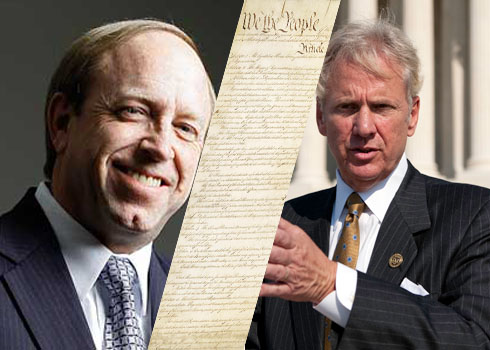The group of Republican state attorneys general [waging](http://tpmmuckraker.talkingpointsmemo.com/2009/12/law_prof_gop_state_ags_objection_to_health_bill_is.php) a public campaign against the Nebraska Medicaid provision in the Senate health bill appear to be scrambling to come up with a valid constitutional argument, already discarding one obscure objection and coming up with two new arguments — which legal experts say are still flimsy.
When the effort was first announced last week, the Republican AGs  stuck to vague language about the (undisputed) unfairness of the “Cornhusker Kickback.” Now, they’ve begun to do more research, or perhaps get more advice, and the result has been no less than three successive arguments against the measure.
Several law professors [told](http://tpmmuckraker.talkingpointsmemo.com/2009/12/law_prof_gop_state_ags_objection_to_health_bill_is.php) TPMmuckraker yesterday that the objections to the provision — under which the federal government would cover all of Nebraska’s Medicaid expansion costs, saving the state $100 million in 10 years — did not have legal merit. The measure was secured by Sen. Ben Nelson (D-NE).
Here, are the three arguments we’ve seen so far, with some comments from Professor Steven Schwinn of the John Marshall Law School and the Constitutional Law Prof [blog](http://lawprofessors.typepad.com/conlaw/):
* **Ports Preference:** Sen. Jim DeMint (R-SC), whose letter questioning the Nelson deal prompted the AGs’ effort, [told](http://www.mcclatchydc.com/homepage/story/81217.html) McClatchy last week that the provision would violate Article I, Section 9: “No preference shall be given by any regulation of commerce or revenue to the ports of one State over those of another.” Schwinn and others thoroughly [debunked](http://tpmmuckraker.talkingpointsmemo.com/2009/12/law_prof_gop_state_ags_objection_to_health_bill_is.php) this argument yesterday, as the ports preference clause bears on issues of ports and trade, not Medicaid.
* **Equal Protection:** Henry McMaster of South Carolina, who is leading the effort, told MSNBC today (video below): “So although the spending power in the Congress is very broad, it is not unlimited. And the case is — the case law under the constitution has said that where you have distinctions are different treatment in a general law. That distinction or different treatment must be based on a reason, some kind of reason like in this case population, poverty, health facilities or something. It can’t be based on just buying a vote.”
Schwinn explains that this argument is rooted in the equal protection component of the 5th Amendment’s due process [clause](http://en.wikipedia.org/wiki/Fifth_Amendment_to_the_United_States_Constitution). But, says Schwinn, if the state AGs sued on this basis, the courts would apply a “rational basis” review, which is extremely deferential to Congress. The government would merely have to show that the Nebraska measure is related to “any conceivable legitimate government interest.”
* **Spending Clause:** Also appearing on MSNBC today, here’s Colorado AG John Suthers (with text of his comment below):
“And I would suggest the essence of the challenge is going to be that the spending power of the Congress is to spend money for the general welfare. And if they are spending money to the benefit of Nebraska and in detriment of all other states, that’s not the general welfare. It’s unprecedented — you know, unfortunately, we are used to all kinds of pork barrel types of payoffs — but where it benefits one state’s taxpayers to the detriment of others, it is an unprecedented situation.”
Now, on its face it seems clear that any earmark for a project in one state would benefit that state’s taxpayers to the detriment of others. In any case, the constitutional argument here bears on the general welfare [clause](http://topics.law.cornell.edu/constitution/articlei) of Article 1, Section 8, which holds that Congress can spend money for the general welfare.
According to Schwinn, what “general welfare” means has been debated since the days of Hamilton and Madison. But, again, the courts have been deferential to Congress’ interpretation of the clause. In other words: the spending clause argument is another non-starter, Schwinn says. “Many bills have all sorts of benefits for specific states.”






